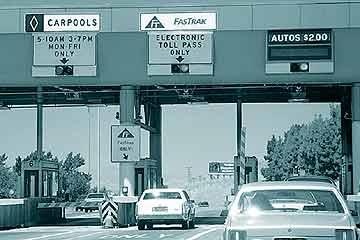
As far back as 1994, when working on the campaign against California's anti-immigrant Proposition 187, I was surprised to learn that all of the younger people on the campaign believed that we would someday all have to carry national identity cards. Nor were they very worried about it.
This article deftly summarizes why it didn't occur to them to worry. According to Christopher Caldwell, we live in a society in which all too often we have "the option of trading a bit of privacy for a load of convenience." We enjoy EZ Pass (or Fastrak) to pay our bridge tolls. We use the Lo-Jack to trace our stolen cars. We're quite ready to plant a minature chip in pets so they don't wander off; can chip implanting at human births be far behind?
In more and more walks of life, if what you want to do is not trackable, you can't do it. ... It now seems quaint that after the Oklahoma City bombing in 1995, Congress argued over whether ''taggants'' should be required in explosives to make them traceable. Today everything is traceable. Altered plant DNA is embedded in textiles to identify them as American. ... The information collected about consumers is the most sophisticated and confusing taggant of all. It is a marvelous tool, a real timesaver and a kind of electronic bracelet that turns the entire world into a place where we are living under house arrest.
When the technical means exist to control human beings, they will be used. Railing against them won't make them go away. We made them; we must also to create the social systems to control our own inventions.
No comments:
Post a Comment